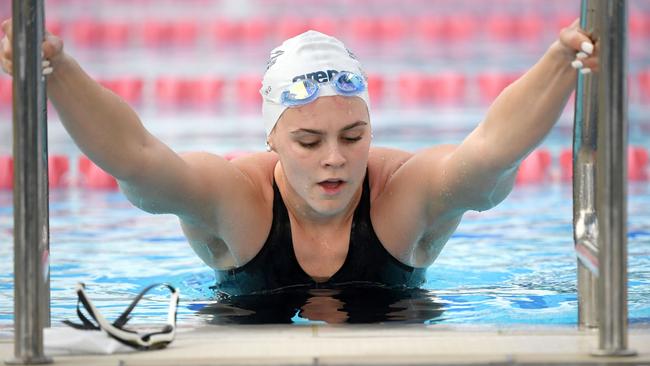Secrets and lies around Shayna Jack have brutalised swimming
The secrets, lies and excuses around Shayna Jack’s exit from the world championships have brutalised the image of the sport

Swimmer Shayna Jack will front ASADA this Friday. There she will find out what level of Ligandrol was found in her blood stream for the first time.
Meanwhile, swimming remains in crisis. The secrets, lies and excuses around Jack’s exit from the world championships have brutalised the image of the much-loved sport.
Swimming Australia chief executive Leigh Russell and her team have followed their current policy regarding positive drug tests to the absolute letter and it has cost them dearly in the court of public opinion.
That policy — which strictly keeps an athlete’s identity private upon testing positive to a banned substance — was implemented in September 2015 by the previous Swimming Australia administration who formed the agreement with ASADA.
The “confidentiality undertaking” prohibited Swimming Australia from comment.
Following this drug scandal that policy surely must be binned. Athletes who test positive to drugs shouldn’t be afforded anonymity.
When you put on the Australian team tracksuit and swim for the country, you need to be transparent, accountable and take responsibility.
Testing positive to drugs shouldn’t be a private thing. The public have the right to know that our swimmers are clean … or dirty.
Last year the Federal Government gave Swimming Australia high-performance funding to the tune of more than $13 million. In total, government funding came to $17m when taking in Paralympic and participation funding over the 2018-19 financial year.
The poor handling of the Shayna Jack issue by Swimming Australia officials on pool deck in South Korea — after the news broke on Saturday afternoon — must now also come under scrutiny. It should have been Australia’s head coach Jacco Verhaeren or Jack’s coach Dean Boxall facing up to the media. But it was left to swimmer Cate Campbell to front up first.
Although Campbell spoke with her usual class and intelligence about the issue — and it must be said she told Swimming Australia officials she was comfortable to do so — it still should not have been her facing the media first.
It is understood Russell will consult athletes, Sport Australia and other sport organisations to have a broader conversation around the handling of issues such as this.
Will the policy change in the future? It is naturally up for review within the next year anyway.
Friday will determine the next move for Jack — what she will plea. She has pointed to a tainted supplement as a possible cause for the positive test.
If it is a supplement that has possibly destroyed her swimming career, a bigger conversation must be had in the sport around using these substances.
Swimming Australia should consider advising athletes not to use them.
I interviewed Olympic champion Sally Pearson a few years back about supplements. Her advice? Just don’t take them. She doesn’t and has become a world champion without them. She said “fruit and vegetables” are enough to get her by.
Meanwhile, a 20-year-old’s life has hit an incredibly low and troubling ebb. Her Swimming Australia payments have been stopped and she can no longer train with her teammates.
Jack has access to welfare support from Swimming Australia, the Australian Institute of Sport and ASADA.
Swimming is a brutal sport, athletes train their heart out for very little money, some even lose money by competing. But it is still a privilege to represent this country and it should be done cleanly.
There is nothing clearer than that and we deserve to know what is going on. Former ASADA boss Richard Ings says WADA is not stopping Swimming Australia from making details of a positive drug test public. Ings says the policy of tennis and athletics is to make provisional suspensions for testing positive public immediately.
“The reality in this modern day is when famous athletes disappear from competition people ask questions,” Ings said. “A policy of secrecy requires the sport and an athlete to mislead the public. Therefore any such policy is untenable.”
THE DAILY TELEGRAPH



To join the conversation, please log in. Don't have an account? Register
Join the conversation, you are commenting as Logout